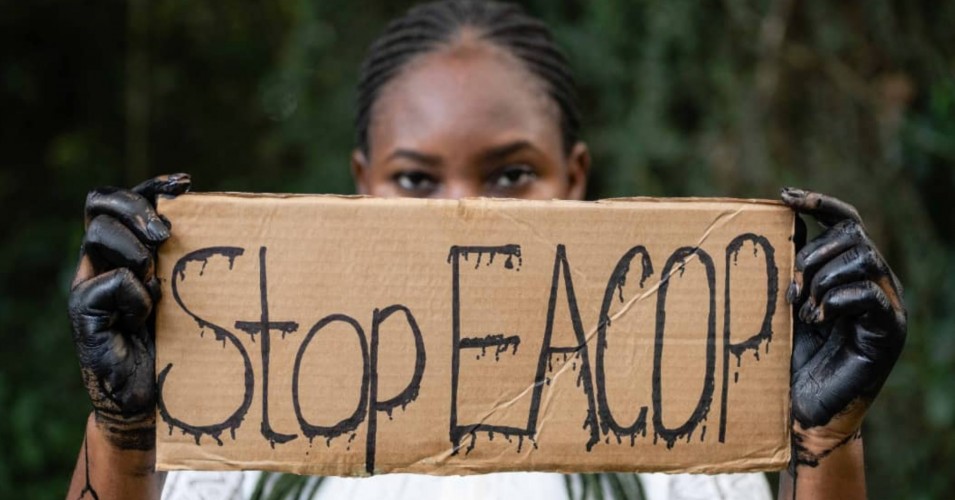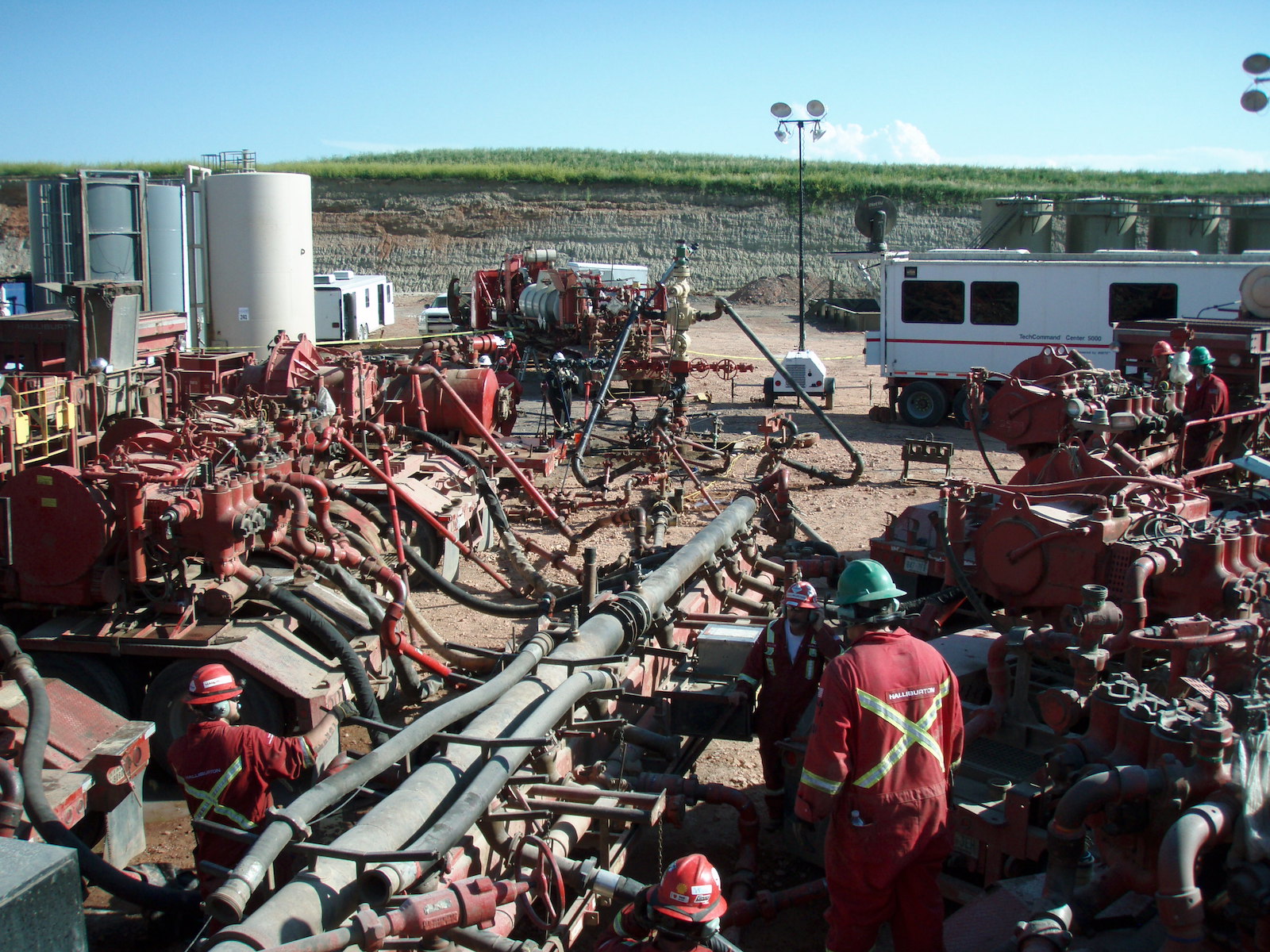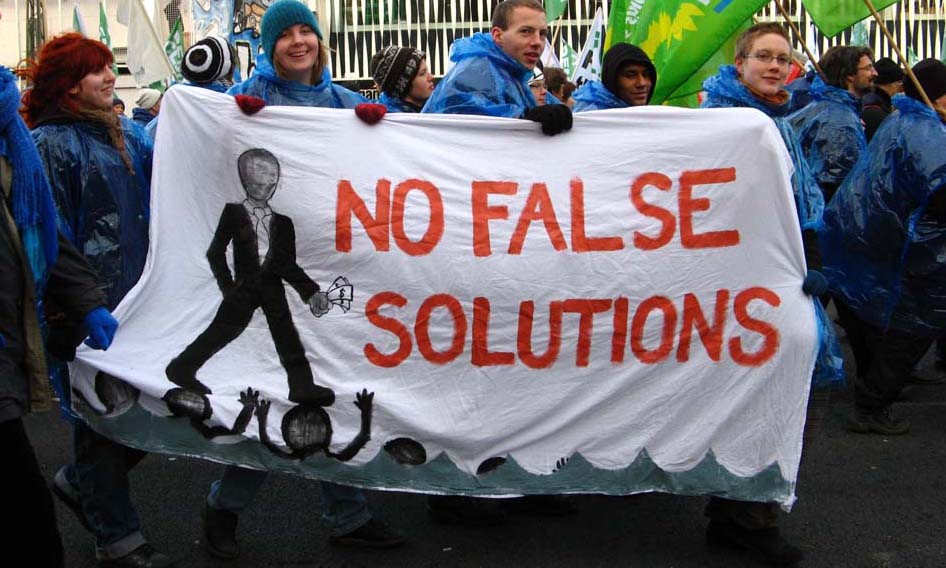
by DGR News Service | Jun 6, 2021 | Biodiversity & Habitat Destruction, Climate Change, Colonialism & Conquest, Culture of Resistance, Direct Action, Mining & Drilling, Movement Building & Support, Repression at Home
Editor’s note: The company has already sold a handful of its onshore oil blocks over the past 10 years, citing the need to cut risk due to community unrest and continued sabotage attacks on its oil installations. These blocks had been snapped up by Nigerian indigenous operators including Seplat Petroleum, Aiteo E&P, First Hydrocarbons and NPDC.
This article originally appeared on Common Dreams.
Featured image: An Ugandan activists holds a sign urging a stop to the East African Crude Oil Pipeline. (Photo: Fridays for Future Uganda/Twitter)
“We cannot drink oil. This is why we cannot accept the construction of the East African Crude Oil Pipeline.”
by Brett Wilkins, Common Dreams staff writer
Climate campaigners in Africa and around the world on Friday continued demonstrations against Total, with activists accusing the French oil giant of ecocide, human rights violations, and greenwashing in connection with fossil fuel projects in Uganda.
On the 145th week of Fridays for Future climate strike protests, members of the movement in Uganda global allies drew attention to the harmful effects of fossil fuel development on the environment, ecosystems, communities, and livelihoods.
Friday’s actions followed protests at Total petrol stations in Benin, the Democratic Republic of Congo, Egypt, Ghana, Kenya, Nigeria, Togo, and Uganda on Tuesday—celebrated each year as Africa Day—against the East African Crude Oil Pipeline (EACOP), now under construction, and the Mozambique Liquefied Natural Gas project.
“Total’s fossil fuel developments pose grave risks to protected environments, water sources, and wetlands in the Great Lakes and East Africa regions,” said Andre Moliro, an activist from the Democratic Republic of the Congo, during Tuesday’s pan-African protests.
“Communities have been raising concerns on the impact of oil extraction on Lake Albert fisheries and the disastrous consequences of an oil spill in Lake Victoria, that would affect millions of people that rely on the two lakes for their livelihoods, watersheds for drinking water, and food production,” he added.
In Uganda, opposing oil development—an expected multi-billion-dollar boon to the landlocked nation’s economy—can be risky business. On Monday, police in Buliisa arrested Ugandan human rights defender Maxwell Atuhura and Italian journalist Federica Marsi.
According to Energy Voice, Atuhura—who works with the African Institute for Energy Governance (AFIEGO), one of half a dozen NGOs that have pursued legal action against Total—and Marsi were about to meet with local community members when they were apprehended.
Marsi was released Monday and reportedly told to leave the oil region “before bad things happen.” She was briefly rearrested later in the day. Atuhura remains in police custody. The World Organization Against Torture has issued an urgent appeal for intervention in his case.
United Nations special rapporteurs and international human rights groups have previously expressed serious concern over abuses perpetrated against land defenders and journalists in Uganda. Despite the risks, actions against EACOP and the related Tilenga Development Project continue.
“We cannot drink oil. This is why we cannot accept the construction of the East African Crude Oil Pipeline,” Ugandan climate justice activist Vanessa Nakate, founder of the Rise Up Movement, said during the Africa Day action. “It is going to cause massive displacement of people [and the] destruction of ecosystems and wildlife habitats.”
“We have no future in extraction of oil because it only means destroying the livelihoods of the people and the planet,” Nakate added. “It is time to choose people above pipelines. It is time to rise up for the people and the planet.”
If completed, the $3.5 billion, nearly 900-mile EACOP will transport up to 230,000 barrels of crude oil per day from fields in the Lake Albert region of western Uganda through the world’s longest electrically heated pipeline to the Tanzanian port city of Tanga on the Indian Ocean.
In partnership with China National Offshore Oil Corporation (CNOOC) and the Uganda National Oil Company (UNOC), Total is also leading the Tilenga Development Project, which involves the drilling of 400 wells in dozens of locations, including iniside the richly biodiverse Murchison Falls National Park.
Total says the project will “generate a positive net impact on biodiversity,” a claim vehemently rejected by environmentalists.
“Imagine a tropical version of the Alaskan oil pipeline,” environmental author Fred Pearce wrote of EACOP last year. “Only longer. And passing through critical elephant, lion, and chimpanzee habitats and 12 forest reserves, skirting Africa’s largest lake, and crossing more than 200 rivers and thousands of farms before reaching the Indian Ocean—where its version of the Exxon Valdez disaster would pour crude oil into some of Africa’s most biodiverse mangroves and coral reefs.”
Although Total claims it chose the EACOP route to “minimize the number of residents relocated,” local residents and international NGOs say the pipeline’s impact will be anything but minimal.
According to Mongabay, more than 12,000 families will be displaced from their ancestral lands to make way for the pipeline, two-thirds of which will pass through agricultural zones. Farmers in the pipeline’s path and the Lake Albert oil region have joined civil society groups and international organizations in voicing their opposition to the EACOP and Tilenga projects.
The #StopEACOP coalition, which is made up of local and international activists and organizations, is attempting to block funding of the project by appealing to banks, investors, and insurance companies. A March open letter signed by more than 250 groups urged 25 commercial banks to not finance the pipeline.
In 2017, WWF Uganda published a report warning that the pipeline “is likely to lead to significant disturbance, fragmentation, and increased poaching within important biodiversity and natural habitats” that are home to species including chimpanzees, elephants, and lions.
Wildlife forced from natural habitats by oil development has in turn caused severe disruptions to farming families.
“We have always had a problem of human-wildlife conflict in this village, but with drilling and road construction across the park, the invasions are more frequent,” Elly Munguryeki, a farmer living just outside Murchison Falls National Park, told South Africa’s Mail & Guardian earlier this month.
“We keep reporting the losses to park authorities but nothing happens,” said Munguryeki. “Each night a herd of buffalo, baboons, and hippos from the park would invade my farm and neighbouring plots and eat our crops until dawn. Whatever they left would be eaten by baboons and wild pigs during the day, forcing us to harvest premature crops.”
A 2020 Oxfam report (pdf) noted the EACOP “will cross poor, rural communities in both Uganda and Tanzania that lack the political and financial capital of the project stakeholders.”
“The lopsided complications of this power dynamic are well-documented in similar extractive industry projects,” the report stated. “Powerful companies are often able to hide their operations behind local contractors and permissive government authorities. Often the only hope that local communities have for remediation or justice is through local government bodies that are often weak, fragile, or captured by corporate and national interests.”
Mary, an Ugandan farmer in Rakai near the Tanzanian border who was interviewed for the report, said that “when this pipeline project came, they promised us too many things. Up to now they have done nothing.”
“What makes me worried is that they took my land but I have not yet been compensated,” she claimed.
A community member from Rujunju village, Kikuube District in Uganda told the report’s authors that “the government and oil companies have not informed us about the negative impact that the EACOP will have on our well-being. All they tell us are good things that the EACOP will bring like roads and jobs. We also want to know the negative impact of the pipeline so that we can make informed decisions.”

by DGR News Service | Dec 9, 2020 | Climate Change, Mining & Drilling, Toxification
Reporting from amidst fields of fracking wells in Colorado, Trinity La Fay writes about the conscious experience of being in relationship to the place she lives, and the disconnect between people and land needed to maintain the destruction.
Experience Is Not An Abstraction
by Trinity La Fey
On the Colorado Rising website, the maps of oil and gas rigs light up the area just above where I live, past my friend’s house halfway up the state, all the way up and out along the plain in a great sweep. Like some demented statistical X, the active wells appear in a sea of blue dots: the abandoned wells. Combined, they swarm completely around the jagged Rocky Mountains, a rising, desperate sea of exploitation.
I remember when the word fracking was used as a supplemental television curse. The way that they said it seemed perfect, as if they understood that it was a primary contributing source of the doom. The story was about a people who, ejected from a poisonous Earth, had colonized in space only to be pursued repeatedly by a predatory cybernetic race. A race they had created. I think stories are important. So does Joseph Campbell, but, as Mary Daly quotes him regarding child victims of sati (the Hindu practice of burning widows alive in the funeral pyres of their late husbands):
“In spite of these signs of suffering and even panic in the actual moment of the pain of suffocation, we should certainly not think the mental state and experience of these individuals after any model of our own more or less imaginable reactions to such a fate, for these sacrifices were not properly individuals at all.”
While I have visions of flickering relatives keening at the river’s edge, smell burning hair, feel the air being sucked from my lungs: he does not imagine their stories are relevant to his experiences.
So, harrumph.
Scrolling out on the Drilling Maps.com site, I see that we, at least, have the resistance of Mountain Range.
Texas; Oklahoma; Louisiana; Mississippi; Kansas; Michigan; the border between North Dakota and Montana. Just about every square inch from Cleveland, Ohio to Pittsburgh, Pennsylvania to Charleston, West Virginia: like fire, the red dots blend. The names of places are all but erased behind them. I cannot see Arkansas written, but I know it is there. From Pennsylvania’s border with New York; all the way down California; all the way up from the Gulf of Mexico to the ice of the Beaufort Sea.
From the Great Lakes down to the Rio Grande; like a ring of fire around the coast of South America, like accidents waiting to happen from the Gulf of Oman to the Barents Sea; like sinking islands from the Arabian Sea to the Yellow Sea to the Tasman Sea. From the North to the South Pacific: companies know no boundaries.
The beneficiaries of these companies, the responsible, I wonder if they learn these names.
I wonder if they are all unreachably psychopathic, or stupid, or if it matters. The dead squirrel on the road; the stoodup friend; the barren landscape full of ghosts: to their experience, it does not matter if it was cruelty or carelessness.
Besides making it possible to set aflame the now undrinkable water that results from such enterprise, whose footage abounds online, Elementa, Science of the Anthropocene, hosts a special collection forum of “Oil and Natural Gas Development: Air Quality, Climate Science and Policy” wherein an article by Chelsea R Thompson, Jacques Hueber and Detlev Helmig, entitled Influence of oil and gas emissions on ambient atmospheric non-methane hydrocarbons in residential areas of Northeastern Colorado discusses ozone levels and calls it abstract.
Like Paul R. EhrlichPaul R. Ehrlich and Carl Sagan in The Cold and The Dark: The World After Nuclear War, everyone agrees that this is not working. Unlike that pivotal conference, however, modern realizations are lost in a desperate sea of distractions. Here is what The Cold and The Dark said abstractly:
“- survivors would face starvation [as] global disruption of the biosphere could ensue. In any event, there would be severe consequences, even in the areas not affected directly, because of the interdependence of the world economy. In either case the extinction of a large fraction of the Earth’s animals, plants, and microorganisms seems possible. The population size of Homo sapiens conceivably could be reduced to prehistoric levels or below, and extinction of the human species itself cannot be excluded.”
Boundaries are underrated.
According to me. Lots of people like to travel; I’m not into it. I have fallen in love with every landscape I’ve seen, but then, I didn’t get to know them. I live in a hard place that I know very well. Wendell Berry and Wes Jackson have a wonderful conversation during which they speak about the necessity of listening to the Others that are places to care for and live with them, and also the joy of being of a place: the intimacy that comes from noticing what cannot be observed in passing. It can be argued that Amber is ancient light that has been stored and that Jet is ancient darkness. Like Saga, they keep our stories. Shale; Oil; Gas; Tar: these exhumed ancestors seem to bellow as they burn that we wake sleeping titans at our peril. Or, as the article put it:
“The findings presented here suggest that oil and gas emissions have a large-scale regional impact on ambient [non methane hydrocarbons] levels, thereby impacting a large population of [-] residents, and representing a large area source of ozone precursors. The short-chain alkanes exhibit strong correlations with propane in Erie/Longmont, Platteville, and within Denver, supporting the conclusion of widespread impact of [oil and natural gas] emissions.”
They recommend further monitoring.
Trinity La Fey is a smith of many crafts, has been a small business creatrix since 2020; published author; appeared in protests since 2003, poetry performances since 2001; officiated public ceremony since 1999; and participated in theatrical performances since she could get people to sit still in front of her.
References and/or Suggested Reading:
- https://www.drillingmaps.com/Colorado.html, 11/16/2020.
- Battlestar Galactica, 2003-2012.
- Mary Daly, Gyn/Ecology: The Metaethics of Radical Feminism, p. 116, 117.
- https://corising.org/colorado-map-oil-gas-wells/, 11/16/2020.
- Ehrlich, Paul & Harte, John & Harwell, Mark & Raven, P & Sagan, C & Woodwell, George & Berry, Joseph & Ayensu, E & Ehrlich, A & Eisner, T. (1984).Long-Term Biological Consequences of Nuclear War. Science (New York, N.Y.). 222. 1293. 10.1126/science.6658451.
- https://www.elementascience.org/articles/10.12952/journal.elementa.000035/, 11/16/2020.
- Wendell Berry and Wes Jackson, https://www.youtube.com/watch?v=5AlPw0KpUmo, 09/27/2012.
Featured image: fracking in progress by Joshua Doubek, Creative Commons Attribution-Share Alike 3.0 Unported.



